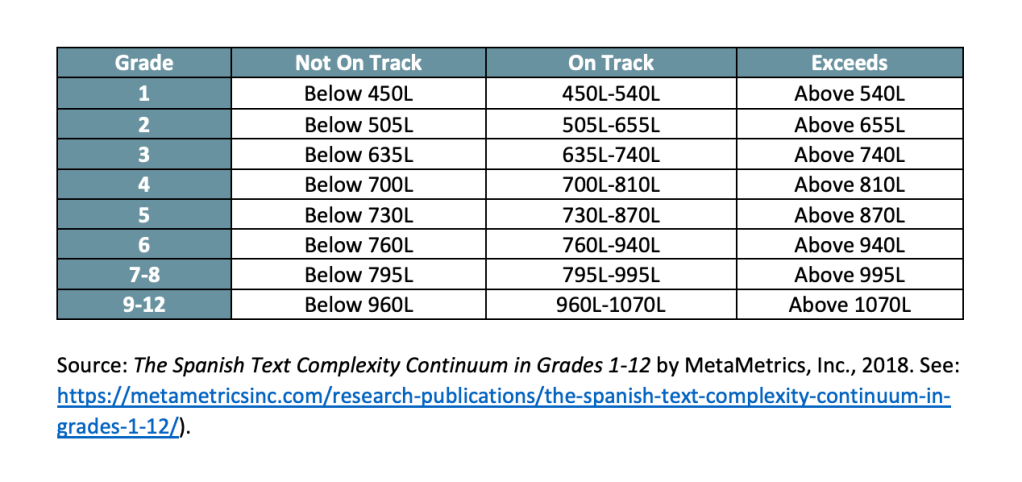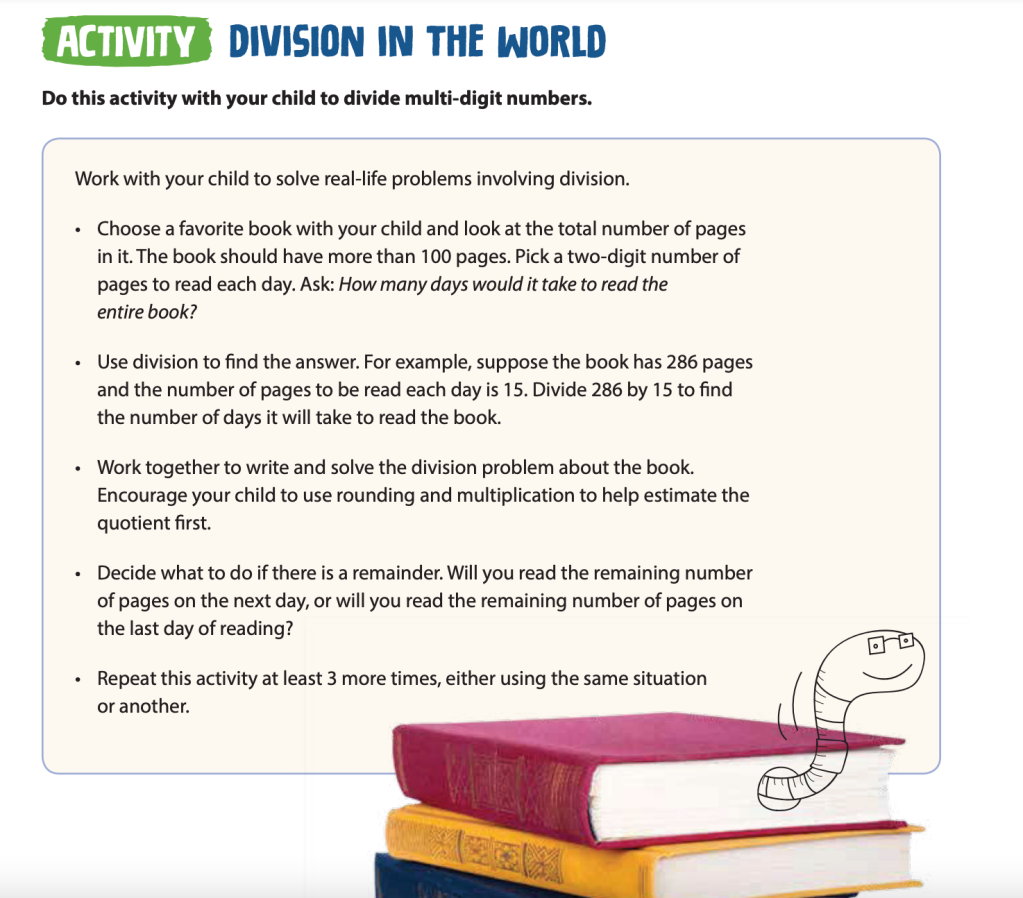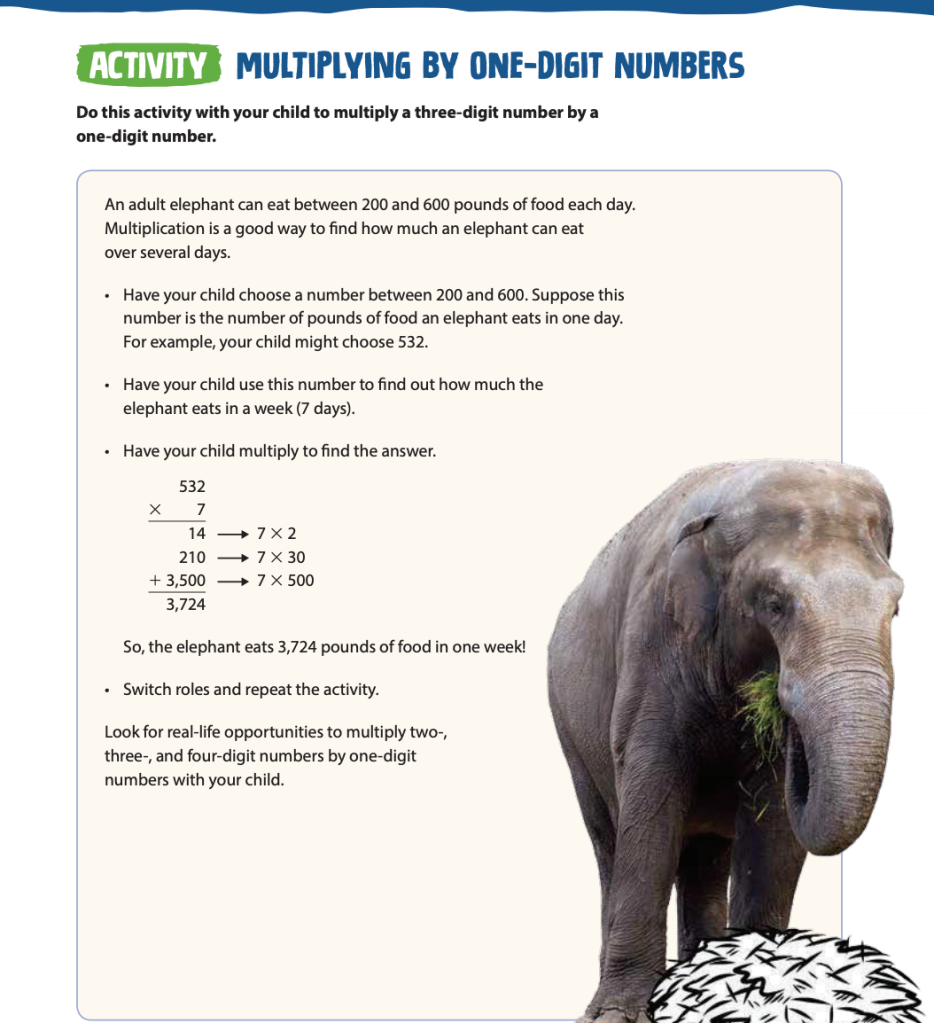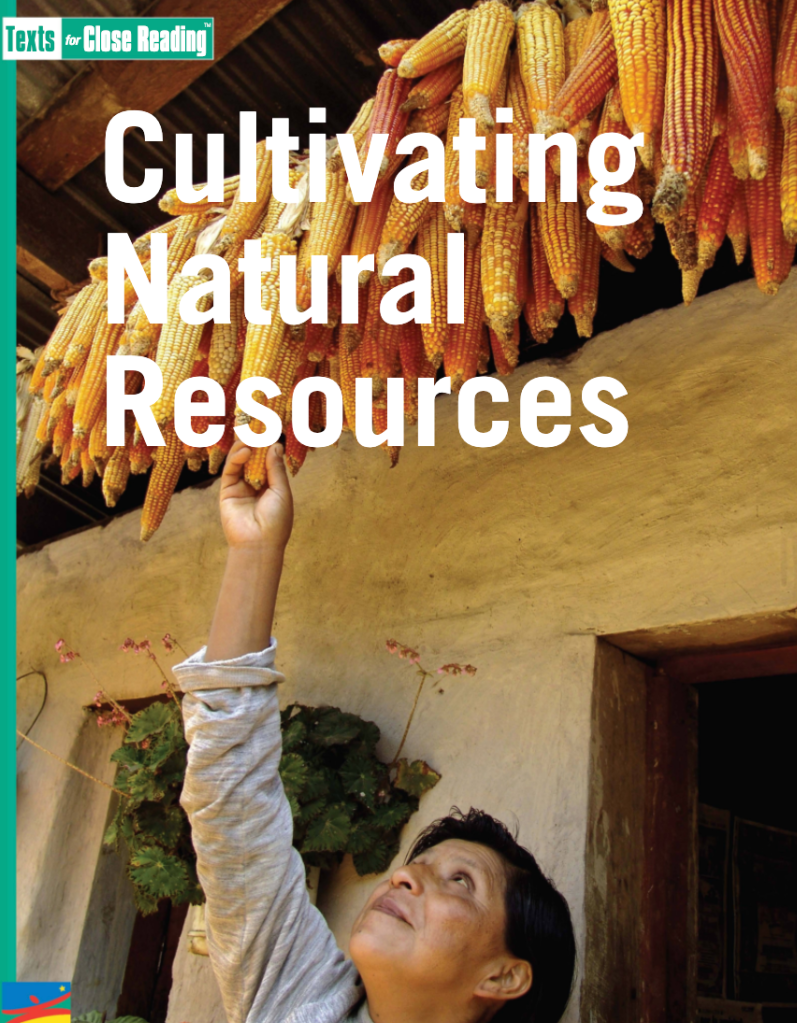Week of 12/4/2023
We can’t believe we have two more weeks left before quarter 2 ends! Here’s what’s happening in fifth grade before we are off to winter break:
Reading: This week, students will complete the Level Set (reading test) on Achieve3000. The purpose of this test is to establish your child’s reading level and monitor progress, so we can continue to support your student’s reading skills. Note that this is only one measure of your child’s reading level.
English Lexile Measure Ranges:

Spanish Lexile Measure Ranges:

Word Study/Language/Mentor Sentences: Don’t forget to ask your fifth grader about mentor sentences! Mentor sentences illustrate grammar rules and/or figurative language elements. Students are continuing to make observations, identifying the parts of speech, analyzing the mentor sentence, revising it, and writing their own version. We want students to be able to manipulate language to become better writers and to understand grammar so well that they are more insightful readers.
Ask your child:
- What is a mentor sentence? What mentor sentence did you analyze recently? What did you learn from your mentor sentence?
Math iReady Diagnostic: This week, our fifth graders will take the iReady Diagnostic (math) test. As mentioned at the beginning of the school year, this test is an adaptive assessment designed to provide teachers with actionable insight into student needs. The results also set a personalized learning path for each student, ensuring they’re working on instruction that matches their unique learning needs. Your child’s teacher will soon be sending a report that gives you a snapshot of your child’s performance. Fifth grade level range expectation is (527-540).
Things to consider:
- Did my child master standards already taught this year?
- Is my child showing his or her work when taking a math assessment?
- What are some math concepts my child needs to review?
- Remember to celebrate their strengths and progress and collaborate with them on planning how they will reach their goals!
We are also approaching the conclusion of unit 2 as we head into the winter break. During this time, students have been engaged in learning about place value, decimals, rounding numbers and adding/subtracting decimals.
Encourage your child to provide some examples of the following math topics we’ve learned about:

Writing: Students will continue to practice informative writing, using our second prompt, “Invasive Species.” Our fifth graders will continue organizing information and supporting their main ideas with evidence.
Ask your child:
- What new writing prompt are you working on? What is the prompt specifically asking you to write about?
- How many sources are you currently reading? What strategies do you use to brainstorm and organize your ideas for the writing assignment?
- After brainstorming your ideas, what’s your next step in the writing process?
Social Studies: We started our Colonial America unit!
This unit, our fifth graders will learn. . .
- About the lives of the colonists who settled in the British colonies
- About people who were brought to the colonies against their will
- About cooperation and conflict between colonists and Native Americans
We will examine the motivations, attitudes, individuals, and circumstances involved in the colonization of what is now the United States, as well as the effects of that colonization on people of the past and present. Questions you may ask your child throughout the unit:
- How did conflict/cooperation among different groups of people affect the development of the United States?
- In what ways was interdependence in Colonial America essential to survival?
- How did all the different roles people had in a colonial village help people survive?
Have a great week!
Fifth Grade Team
Week of 11/13/2023
Reading/Word Study: Purpose of Our Word Study Unit: The purpose of our word study unit is to deepen student’s understanding of phonics and word patterns, enhancing reading and spelling skills. Recently, our students focused on r-controlled words.
Ask your child:
- Why is word study/phonics important? (Understanding r-controlled vowels helps students master phonics rules, enabling us to decode and read more complex words accurately.)
- Can you find examples of r-controlled vowel words in signs, books, or other real-world contexts?
Mentor Sentences: Don’t forget to ask your fifth grader about mentor sentences! Mentor sentences illustrate grammar rules and/or figurative language elements. Students are continuing to make observations, identifying the parts of speech, analyzing the mentor sentence, revising it, and writing their own version. We want students to be able to manipulate language to become better writers and to understand grammar so well that they are more insightful readers.
Ask your child:
- What is a mentor sentence? What mentor sentence did you analyze recently? What did you learn from your mentor sentence?
Science: Our scientists have been immersed in exploring mystery substances. The focus has been on carrying out tests to become familiar with the unique properties of these mystery powders. It has been a hands-on and engaging experience that encourages curiosity, critical thinking, and teamwork.
We encourage you to spark further conversation at home by asking your child:
- Can you describe any surprising or interesting observations you made during the experiments?
- What discussions did you have with your classmates about the properties of the mystery substances?
- How did you work with your classmates to conduct tests and share findings about the mystery substances?
- What was your favorite part of the experiment? Why did you enjoy it?
Math: Our mathematicians have been diving into the world of decimals and strengthening their subtraction skills. The ability to subtract decimals is a crucial skill that not only reinforces their understanding of place value but also prepares them for more advanced mathematical concepts.
Ask your child:
- Can you share a specific example or problem you’ve worked on recently?
- Why is it necessary to line up decimals when subtracting?
- Can you think of situations in the real world where you might need to subtract decimals?
Writing: We are continuing on the process of informative writing. As we guide them through the process we are making sure students are:
- Responding to all parts of the prompt
- Introducing a topic clearly and providing a general observation and focus.
- Grouping related information logically.
- Developing the topic with facts, definitions, concrete details, quotations, or other information and examples related to the topic.
- Providing a concluding statement or section related to the information or explanation presented.
¡Gracias! As Thanksgiving break draws near, we wanted to take a moment to express our deepest gratitude for the incredible children we have the privilege of teaching and guiding every day. Your children bring joy, curiosity, and amazing energy to our classrooms, making our school community truly special.
We wish you and your families a warm and joyful Thanksgiving break. May it be filled with moments of gratitude, togetherness, and the making of beautiful memories.
Fifth Grade Team
Week of 10/24/2023
Reading: Welcome to our next unit of study, “Developing Characters’ Relationships.” We are beginning our second unit in the Benchmark Advance program. In this unit, your child will read stories in which he or she compares characters and analyzes their relationships with each other. We will read several excerpts from Mark Twain’s The Adventures of Tom Sawyer. This will help students get an idea of how different characters interact with each other, and it will also help them understand what makes some characters more likable than others. In addition to this classic example of realistic fiction, the unit also includes some letters, as well as a biography. It will be fun to discover how they make connections between the characters in the stories and people in real life. And what better way to do it than through reading an important piece of American literature?
Science: Our students will become members of the Matter Mysteries Hotline team, in which they will act as Science Investigators who are responsible for solving seven matter mysteries. Students will explore the properties of matter, what happens when different substances are combined, and compare and contrast different states of matter to form an understanding that substances have different properties and mixing two substances can result in a new substance.
Students will also engage in engineering design projects, and will write scientific arguments and explanations to communicate their findings.
Students’ investigations during this module are designed to help them answer science questions, referred to as Driving Questions. Watch this trailer video to find out more about what your student will be learning.
The module begins with a mystery in which students investigate the properties of different materials, and identify materials based on their properties. You can enhance your student’s learning about the properties of materials by continuing to explore these topics with them at home.
How Can You Support Your Child’s Learning?
- Playing a guessing game. Name four or five properties of a material or substance (e.g., apple juice, chalk, wood, etc.) and have your student guess what substance you are thinking of. Or, you could play a game based on “Twenty Questions”, and have your student ask if the material or substance you are thinking of has certain properties. Be sure to switch roles so that you do the guessing next.
- Invite your student to identify the proper units of measurement (e.g., centimeters or inches for length, milliliters or ounces for volume, etc,) when relevant.
Encourage your student to use precise, observation-based academic language when discussing the properties of materials, not opinion-based language.
Math: This week, our focus continues on helping our students understand and represent decimals in various forms. How Can You Support Your Child’s Learning?
- Engage in discussions about decimals. Ask your child to identify decimals in everyday situations.
- Explore real-life scenarios where decimals are used, such as in financial situations, cooking measurements, and sports statistics.
- Also, check out our next math activity below:

Donations and volunteer opportunity: If you are able to donate decorating icing pens for our Día de los Muertos sugar skull activity, please send them to your child’s teacher.
Also, volunteers are needed, Monday, October 30th after school to make sugar skulls. Join us in the hallway (first floor by the kinder area). Let your child’s teacher if you can help us out!
Mexican Fiesta: The Camarena Community is invited to our school’s Fiesta Mexicana on Friday, November 3rd starting at 3:00 to 6:00 p.m. Stop by to enjoy tasty food from a variety of vendors, listen to great music, and enjoy performances by our students!
Have a great week!
Fifth Grade Team
Week of 10/16/23
Hello Fifth Grade Families!
It’s been a full week of learning after returning from a well-deserved fall break, recharged and ready to take on the rest of the quarter! 🍁
This week we are wrapping up our Biztown lessons before our big day on Wednesday! Now that students have been placed in their Biztown jobs, we will focus on the following concepts:

- What Do Good Businesses Look Like?
- Before moving into JA BizTown business teams, students will spend time brainstorming the characteristics of good businesses. What makes some teams of employees more successful than others? Why do businesses fail? How can a business achieve success?
- How Do We Advertise a Business?
- Students will learn about the importance of advertising as a method of marketing the goods and/or services offered by various businesses. Working in business teams, students develop advertisements to market their JA BizTown businesses.
Reminder for field trip: Students should wear business casual clothes appropriate for their JA BizTown business position.
Writing: We are continuing on the process of informative writing. Currently, students are learning about sea creatures and eventually write an informative essay. As we guide them through the process we are making sure students are:
- Responding to all parts of the prompt
- Introducing a topic clearly and providing a general observation and focus.
- Grouping related information logically.
- Developing the topic with facts, definitions, concrete details, quotations, or other information and examples related to the topic.
- Providing a concluding statement or section related to the information or explanation presented.
Reading/Word Study: Our fifth graders have been engaged in our new word study unit, with a new focus this week on long vowel sounds.
Ask your child: Here are some guiding questions to spark meaningful discussions:
- Can you find examples of words with long vowel sounds in your reading books? How do you know they are long vowel sounds?
- How are long vowels and short vowels different?
Math: This week, our focus is helping our students understand and represent decimals in various forms. How Can You Support Your Child’s Learning?
- Engage in discussions about decimals. Ask your child to identify decimals in everyday situations.
- Explore real-life scenarios where decimals are used, such as in financial situations, cooking measurements, and sports statistics.
- Also, check out the activity below:

VAPA: It’s our VAPA week! A reminder that students receive PE, music, and art instruction from our very talented VAPA teachers. Make sure you check in with your child on Tuesday after school and ask:
- What did you learn in VAPA today? What was the most exciting part? Who are your VAPA teachers? What do you mostly look forward to every VAPA week?
Have a great week!
Fifth Grade Team
Week of 9/11/2023
Reading/Word Study: Our fifth graders have been engaged in our new word study unit, with a particular focus on short vowel sounds.
Purpose of Our Word Study Unit: The purpose of our word study unit is to deepen student’s understanding of phonics and word patterns, enhancing reading and spelling skills.
Why Short Vowel Sounds Matter: Short vowel sounds play a fundamental role in English language skills development. By mastering short vowel sounds, students can:
- Improve their reading fluency and comprehension.
- Enhance their spelling accuracy.
- Decode and encode words more effectively.
- Boost their overall language proficiency.
Ask your child: Here are some guiding questions to spark meaningful discussions:
- What are short vowel sounds, and why are they important in reading and spelling?
- Can you share some examples of words with short vowel sounds that you’ve learned in class?
Read Aloud: This week, we are continuing with our latest read aloud, Our of My Mind. It is narrated by a girl with cerebral palsy who’s very intelligent but unable to express herself verbally or physically. When Melody is integrated into some general classes at school, many kids are purposely mean; others are cruel through their assumptions that Melody is incapable of understanding them. Below is a book trailer that you can gives more details.
To keep the dialogue going, consider asking your child:
- What predictions can the reader make about the narrator of the story? What inferences can be made about the thought processes of the narrator’s mind?
- In a world that does not work for her, what seems to cause the biggest frustrations for Melody?Check out this video to learn more about the book: https://www.youtube.com/watch?v=nCG6e2DifxY
Science: Our driving question for this week: How do scientists and engineers work as a team? Students will be introduced to classroom routines, expectations, and teamwork skills that will be important for their success in science this year. Working in teams, students will explore evidence to solve mysteries and team challenges.
Ask your child:
- What are the essential skills and behaviors that make scientists and engineers effective team members?
- What are some examples of real-world scientific or engineering projects that required interdisciplinary teamwork?
- What role do effective communication and active listening play in scientific and engineering teamwork?
Math: Check out this math activity you can review with your child to strengthen your child’s math skills!

Parent/Teacher Conferences: Conferences begin this Thursday, September 15th and will continue through Thursday September 21st. Dismissal time will be at 1:15. If you have not yet signed up for a conference date/time, please contact your child’s teacher.
Have a great week!
Fifth Grade Team
Week of 8/28/2023
This week, our emphasis will be on building upon the skills we introduced last week. Practice are key components of effective learning, and we believe that revisiting skills will help solidify student’s understanding and confidence.
In the meantime, check out this activity you can work with your child. Feel free to share with us if you tried it!

Week of 8/21/2023
Reading: Welcome to our first unit of study, “Cultivating Natural Resources.” In this unit, your child will read and compare selections about cultivating food in the past and today to understand how we develop our natural resources. Students will explore the big business of farming as well as how to grow corn in your own neighborhood. We will look especially at the history of corn as a food resource in North America, and follow its development into the big industry it is today. The selections in this unit feature a variety of genres, including informational texts, opinion essays, tall tales, folktales, and editorials. This unit is sure to inspire deeper interest in where our food comes from, and it provides good opportunities for out-of-the-classroom learning.
Math: Our students will be wrapping up the volume unit this week. Throughout the unit, they have been learning about various concepts related to volume, understanding units of measurement, and applying these skills to real-world scenarios. We encourage you to discuss their learning experiences at home and engage in conversations that reinforce their understanding of volume concepts. We will have a unit assessment later this week.
Please encourage your child to review their notes, math textbook, and any other materials they’ve received during the unit to prepare for our test.
Writing: This week, students are continuing to learn about the expectations of a fifth grade short constructed response.
Ask your child:
- What is a short constructed response and what does the response include?
- What did you write about this week?
Language/Grammar: This week, we will be focusing on sentence types and structure. Understanding the different styles of sentences (declarative, interrogative, imperative, and exclamatory) is a crucial step in developing effective communication skills. Additionally, we’ll be guiding them in recognizing the subject (who or what the sentence is about) and the predicate (the action or information about the subject) in various sentences.
Discuss with your child:
- Engage in Conversations: During mealtime or family discussions, encourage your child to identify different types of sentences. Ask them to provide examples of declarative (statements), interrogative (questions), imperative (commands), and exclamatory (exclamations) sentences.
- Daily Reading Time: When reading, ask your child to point out sentences from the book and identify the subject and predicate in each sentence.
Read Aloud: We are currently reading Morning Girl, a novel that explores the world of a sister and brother living on a lush island in the Bahamas just before the arrival of Columbus. The story has helped our fifth grade readers imagine what life was life before the European explorers landed and changed life dramatically. We’ve used the text to study forms of figurative language. Some questions to ask your child as we continue to read Morning Girl:
- What is a simile, metaphor, or personification?
- Here’s an example of a simile from the book: “Mother’s voice was unhappy as a fish pulled into the air from the sea.” Why is this a simile? What is the author trying to tell us?
Have a great week!
Fifth Grade Team
Week of 8/14/2023
Writing: This week, students are analyzing a fifth grade level short constructed response. We are currently working on the “RACES” strategy, which teaches students how to respond to open-ended questions. This strategy reminds students to answer questions completely and cite evidence and examples from the text.
Ask your child:
- What is a short constructed response and what does the response include?
- What is the purpose of a short constructed response? Why do we have to write these types of responses in fifth grade?
Language/Grammar: By now, your child has learned that grammar refers to the formation and structure of words and how they come together to create phrases, clauses and sentences.
- Ask your child the meaning of the following parts of speech: article, noun, verb, adjective, adverb, pronoun, conjunction and preposition.
- How are the parts of speech distinct from each other?

Read Aloud: We are currently reading Morning Girl, a novel that explores the world of a sister and brother living on a lush island in the Bahamas just before the arrival of Columbus. Its lyrical text will be also be used to study forms of figurative language. The story will help our fifth grade readers imagine what life was life before the European explorers landed and changed life dramatically. Some questions to ask your child as we continue to read Morning Girl:
- What is a simile, metaphor, or personification?
- Here’s an example of a simile from the book (page 4): “Mother’s voice was unhappy as a fish pulled into the air from the sea.” Why is this a simile? What is the author trying to tell us?
Math: Our focus has been on the fascinating world of volume and its connection to formulas. Students will learn that formulas help calculate the volume of various three-dimensional shapes and complex problems.
Ask your child:
- What is Volume? – Discuss what volume represents in the context of three-dimensional objects. How does it differ from area in two-dimensional shapes?
- Why are Formulas Important and why do we use them? – Explore the significance of using formulas to calculate volume. How do formulas simplify complex problems?
- Real-World Applications – Can you identify instances in our daily lives where understanding volume is essential? Consider scenarios like packaging, containers, or even construction.
- Hands-On Exploration – Engage in a practical activity involving different objects. Can your child estimate the volume of a box, a sphere, or a cylinder? Measure their dimensions and apply the formulas to calculate their volumes.
Social Studies: Students have now examined the four major pre-Columbian settlements, the Pacific Northwest, Southwest, Plains and Eastern Woodlands. To demonstrate understanding, students will create a trifold of a specific region and write about “A Day in the Life of your Native Region.” Through this project, we aim to foster a deeper understanding of cultures, geography, and the uniqueness that makes each region special.
Ask your child:
- What Makes This Region Special? Discuss how the elements in the diorama your child is creating represent different aspects of the region’s culture, whether it’s through clothing, architecture, or traditions.
- What Have You Learned? Ask your child to share something surprising or interesting they’ve discovered about their native region.
Have a great week!
Fifth Grade Team
Week of 8/7/2023
Reading: As our students have successfully completed the recent Level Set reading test, our next step in introducing the use of note-taking skills to ensure their understanding of the Achieve articles.
Ask your child:
- What Achieve article are you currently reading?
- What strategies do you use to make sure you stop and think about the reading and fully understand the article?
Writing: We are continuing to cultivate a positive classroom community and recently, we introduce writing by reading, The Best Part of Me. This book combines black-and-white illustrations with real children’s words describing what they love most about their bodies. It’s an insightful read and never fails to get kids talking and writing about the best part of themselves! Continue the conversation at home by asking your child:
What is something about yourself that you love? Why? What is the BEST part of yourself? What are three reasons that support your idea?
Grammar/Language: Our fifth graders have been diving into the world of grammar, exploring the different parts of speech. We’ve covered nouns, both common and proper, adjectives, verbs, pronouns, and more! Understanding parts of speech will lay the foundation for effective 5th grade communication and writing skills.
Ask your child:
- What makes proper nouns different from common nouns? Can you provide examples?
- Look around the room—how many nouns can you identify?
- Can you describe your favorite book character using adjectives?
- What is the purpose of verbs in a sentence?
Math: Our recent iReady curriculum has taken an exciting turn as we dive into the world of volume! What is Volume? Volume is the measure of how much space an object occupies in three dimensions. It’s a fundamental concept that applies to various real-world scenarios, from filling containers to understanding the capacity of shapes.
To strengthen your child’s understanding of this new concept, check out the activity below:

VAPA: Don’t forget that every two weeks on Tuesday, your child will participate in VAPA (Visual and Performing Arts). Make sure you check in with your child on Tuesday after school and ask:
- What did you learn in VAPA today? What was the most exciting part? Who are your VAPA teachers? What do you mostly look forward to every VAPA week?
Have a great week!
Fifth Grade Team
Week of 7/31/2023
Reading: We will continue to strengthen reading expectations to ensure the success of our reading block for the rest of the year. We will also begin our reading assessment (Level Set) this week. The purpose of this test is to establish your child’s current reading level and monitor progress, so we can continue to support your child’s reading skills. Below is a chart you can reference. (Fifth grade expectation is 830L- 1010L.)

Writing: Last week, we introduced W.O.W (Work on Writing) to help build with writing stamina and fluency. Our goal is for students to write with a natural flow and rhythm by practicing writing each day. Students will work on building stamina allowing them to write for extended periods of time and a topic of their choice.
Ask your child:
- What did you write about in your WOW journal today?
- How was your writing stamina today? Did you write the whole time?
- What are some favorite topics you enjoy writing about?
Read Aloud: This week we will start our first read aloud. Morning Girl is the story of a Taino girl and her brother, told in alternating first-person chapters from each of their perspectives. The setting is Hispaniola, near the time of Columbus’ first landing. Some questions you can begin to ask your child are:
- How would you describe Morning Girl?
- What are Morning Girl’s main complaints about her brother Star Boy?
- What is the point of view in this story? From whose perspective do we see events?
iReady Math Diagnostic: This week, our fifth graders will take the iReady Diagnostic (math) test. This test is an adaptive assessment designed to provide teachers with actionable insight into student needs. The results also set a personalized learning path for each student, ensuring they’re working on instruction that matches their unique learning needs. Fifth grade level range expectation is (480-540).
Things to consider:
- Did my child master standards already taught this year?
- Is my child showing his or her work when taking an assessment?
- What are some math concepts my child needs to review?
- Remember to celebrate their strengths and progress and collaborate with them on planning how they will reach their goals!
Social Studies: We are continuing with our Native American unit: Examining major pre-Columbian settlements and how the North American Indians were diverse in their language, culture, social and political organization, and traditions.
Students will watch videos, take notes, and engage in group discussions. Please continue the conversation at home by asking:
- What did you learn about the Native American Tribes?
- What was the land and climate like there?
- What was their home like?
Hydrostation Field Trip: This week, our first round of fifth graders will participate in our first field trip organized by CVESD Hydrostation. Your child will engage in lessons and learn more about their strengths, interests, values and how they may align with career options. Students will learn about RIASEC, an abbreviation that stands for realistic, investigative, artistic, social, enterprising and conventional. They will use RIASEC to rank their top 3 strengths and interests. Questions you may ask your fifth grader after they experience the Hydrostation:
- Were there any surprises when you learned about the different career paths related to each personality type? Is there a particular job that caught your attention?
- How do you think your strengths and interests align with your current extracurricular activities?
- Are there any new career possibilities you’d like to explore based on what you learned about RIASEC?

Have a great week!
Fifth Grade Team














